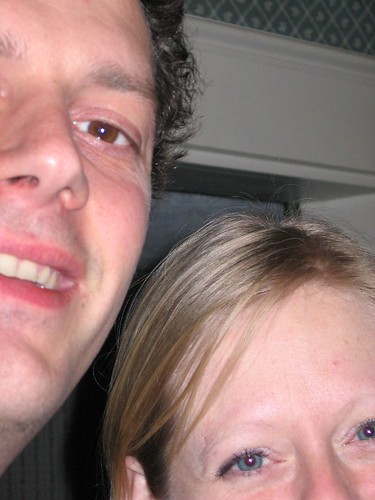Collaboration.
One hears about it in business and creative contexts all the time. Two entities working toward a common goal. Sounds pretty positive, right? It is always portrayed as such. Look at the opening paragraph (as of 6/14/11 at Noon) from wikipedia, the most collaborative of sources, on this most buzzy of words:
Collaboration is working together to achieve a goal, but in its negative sense it is working as a traitor.[1] It is a recursive[2] process where two or more people or organizations work together to realize shared goals, (this is more than the intersection of common goals seen in co-operative ventures, but a deep, collective, determination to reach an identical objective) — for example, an intriguing endeavor[3][4] that is creative in nature[5]—by sharing knowledge, learning and building consensus. Most collaboration requires leadership, although the form of leadership can be social within a decentralized and egalitarian group.[6] In particular, teams that work collaboratively can obtain greater resources, recognition and reward when facing competition for finite resources.[7] Collaboration is also present in opposing goals exhibiting the notion of adversarial collaboration, though this is not a common case for using the word.
Wow, sounds like the solution to all the world's problems, right?
It's unfortunate that we never discuss the downsides of collaboration.
I've been thinking a lot recently about some career goals and the major distinctions in my mind between writing as an endeavor and a host of other things that also tempt as possible career options: (Architecture, Event Planning, Experiential Branding/Marketing.)
One thing that stands out is that writing , by its nature, does not HAVE to be collaborative. The written or spoken word is something I can manipulate by myself. I can craft a sentence, I can create a theme, I can prove a point, solely by the work of my own hands and mind, if I choose. All those other disciplines, and the vast majority of careers out there require the collaboration between boards, vendors, managers, installers, etc.
The first big problem with these ventures is that in working together, one can easily lose efficiency. If you're a rapid producer, a multi-tasker, and a quick thinker, collaboration often means slowing down for the rest of the group. Now, sometimes, obviously this can lead to more careful reflection and critical thought, but it often just leads to not getting---things---done, while consensus is reached via arduous discussions. Especially if one knows how to do the task at hand, deliberation between members of a group can be the albatross around your neck.
The second, less recognized problem, is that when collaborative thought becomes a goal, it has the danger of being an end unto itself, and not serving the product, but rather the participants. Good ideas do not necessarily come from a multitude of sources. Sometimes a good idea crafted by one person is just the best idea. But the goal of collaborative thought can't leave that good idea alone. It has to make sure all voices are represented in that idea and may contaminate it with other lesser notions for the sake of inclusivity. Any number of projects I've worked on have been lessened by the layering of other personalities' opinions onto the final product, solely for the sake of nurturing egos. I'm even including the unnecessary injection of my own ideas, which aren't always the best ones in the room.
All this is not to say that collaboration is inherently worse than going it alone. But in our society, it's worth reminding ourselves that sometimes the Marlboro Man is OK, working out there on the range. He's got his task and can get it done without intervention from the masses. And this is coming from an extrovert who both likes to be around people as much as humanly possible and works well with others when necessary. But most of the time, I would prefer if you gave me a task and let me go about my day. I'll get a lot more done without anyone else in the room.
skip to main |
skip to sidebar


A collection of words and images, all linked, sometimes loosely, to the house in which we live. It's like Martha Stewart Living... but intentionally funny.

About The Blog
Why "The House"?
Because it seemed like a good heading to cover most of the things I like to talk about. The act of just living is so much more important than the 40+ hour a week crap we have to do to get to the good stuff.
Because it seemed like a good heading to cover most of the things I like to talk about. The act of just living is so much more important than the 40+ hour a week crap we have to do to get to the good stuff.
About Us

- The Speaker of the House
- We Live in the Mt. Airy neighborhood of Philadelphia, PA. We married in May '06, bought our first house in September '07. Got a dog in October '08. Continued drinking heavily throughout.
Rooms in the House
- City Living (15)
- Conversations with Our House (3)
- Conversations with Your House (3)
- Greenhouse (26)
- home entertainment (13)
- Home for the Holidays (4)
- Home School (4)
- Homecooking (15)
- House Design (21)
- House of A (1)
- House of K (16)
- House of R (5)
- Housedress (3)
- Housekeeping (12)
- Houseparty (8)
- Housepet (13)
- Houseshopping (38)
- Housework (29)
- The House Red (2)
- The Wise Man Built His House (9)
- White House (10)
Other House Blogs (* Denotes Other Philly Housebloggers)
- DC Rowhouse
- Rowhouse Blog
- Project Rowhouse
- This D*mn House
- Baltimore Rowhouse
- 100 K House*
- Houseblogs
- House Obsession
- Man of the House Blog
- Learning as We Go*
- re:habitat
- 86in It
- Home Improvement Ninja
- Clean Like a Man
- Grassroots Modern
- The Hardware Aisle
- One Project Closer
- Home Construction Improvement
- Straight from the Farm
- House In Progress
- Bake and Shake
- Tool GuyD